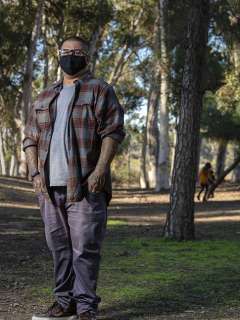For some, the sense of smell has yet to return. For others, a haze clouds their mind and thoughts don’t crystallize like they used to. Still others become short of breath from the slightest activity or feel their heart racing even as they sit still.
The symptoms associated with what has become known as “long COVID” or “long-hauler syndrome” are as varied as whom they afflict — some long-haulers previously were hospitalized for COVID-19; others had a mild case but are plagued by lingering issues that never fully resolved, even months after diagnosis.
To learn more about the condition and what might be done to help those suffering from it, the U.S. Centers for Disease Control and Prevention (CDC) is conducting a nationwide study that will collect and examine health records from thousands of Americans. UCLA Health is among eight academic medical centers participating in the INSPIRE (Innovative Support for Patients with SARS-CoV-2 Infection Registry) effort, which takes place entirely online.
“There are so many unanswered questions,” says Joann Elmore, MD, MPH, a professor of medicine at the David Geffen School of Medicine at UCLA and principal investigator of the study at UCLA. “We don’t yet know how common it is for individuals to experience long-term health issues after a COVID-19 infection, making it harder to look out for specific signs and symptoms. If we want to be able to prevent and treat long-haul symptoms, we need more data”
Any adult who was experiencing symptoms suggestive of coronavirus and had a COVID-19 test within 28 days — whether it came back positive or negative — may be eligible to volunteer. The study involves allowing digital access to medical records and completing short, online surveys every three months for the next year and a half. No doctor visits are required and volunteers don’t need to be UCLA Health patients. Enrolled participants will be compensated up to $100.
The study aims to collect health information and survey responses from 5,000 adults that researchers can analyze to learn more about long-hauler syndrome, what symptoms comprise it and its frequency of occurrence.

“We want answers and we have a lot of questions,” Dr. Elmore says.
An epidemiologist who studied at Yale, Dr. Elmore has been at the forefront of identifying emerging conditions before. Yale University is near Lyme, Conn. — where Lyme disease was first identified — and she recalls seeing rashes and fatigue in patients and wondering about the disease behind the symptoms.
“We need to push science to be a little faster here,” she says. “So that if there are things that we can do as physicians to help prevent this or help treat it, we can know sooner.”
Ruben Salazar, 43, is also looking for answers. The married father of two came down with COVID-19 in June and continues to have physical and psychological symptoms. Climbing a flight of stairs leaves him fatigued. His memory isn’t as sharp as it used to be and he sometimes has trouble focusing. “It’s kind of like a brain fog,” he says.
Like Dr. Elmore, Salazar hopes the study sheds light on long-hauler syndrome and potential remedies.
“I hope it gives answers to questions that people need answers to,” he says. “If I have issues, I hope they have answers for it.”
For more information on the study, or to find out about participating, visit inspirecovidstudy.med.ucla.edu



